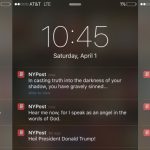Connected devices can easily do cyber attackers' bidding

Connected cameras, vending machines or light bulbs were the vectors of the latest cyber-attacks. It is just the beginning of a long list of Internet of Things that will be used by hackers to take down businesses or steal data. But who should be blamed for this new situation?
We heard about the promise of a better life when everything will be connected to it. We trusted it because we loved the idea of having an easier life and access to more services at the same time. Manufacturers also saw a huge opportunity in that trend for new business, so everybody was happy.
Hacked! New York Post mobile app compromised in security breach

The New York Post suffered a security breach this weekend when its push notification system was compromised. Unknown attackers used the system to send out messages to users of the New York Post mobile app.
The hackers sent out messages with strange, cryptic content. One read "Heil President Donald Trump!", while others had a religious or spiritual tone to them, and one quoted a Nirvana lyric.
How the dark web creates a fraud pandemic

The statistics continue to chill. Two point three million estimated fraud victims in the UK alone in 2015 according to the ONS. 173,000 confirmed reports of identity theft amongst CiFas members (largely utilities and finance companies) in 2015.
From a consumer perspective the chances are that over a period of three to four years you are now more likely than not to be a victim of a successful fraudulent act of some kind.
CIA's internal hacking tools rival those of the NSA

Debate and discourse around WikiLeaks’ announcement about a series of leaks from the CIA continue unabated. Codenamed "Vault 7," WikiLeaks claims this is the largest classified information leak to have come from the CIA to date. Added to that, only one percent of documents have been made public so far.
From the leaked documents it’s become clear that the CIA has created its own internal hacking capabilities to rival that of the NSA. It may be more tactical than strategic -- but with exploit sets including Android, IoS, Samsung TVs, Linux, Mac, zero day attacks and more, it could certainly give the NSA a run for its money.
WikiLeaks' Dark Matter documents reveal CIA hacks for Macs and iPhones

It's only a couple of weeks since WikiLeaks unleashed the first batch of its Vault 7 CIA documents, revealing the agency's spying and hacking capabilities. Now the organization has released a second cache of files dubbed Dark Matter, and they show that the CIA has developed tools for hacking Apple products.
Bold and exciting names like Sonic Screwdriver, DerStarke, Triton and DarkSeaSkies are the monikers given to attack the firmware of MacBooks and iPhones. What's particularly interesting about the documents is that they appear to show that the CIA had the ability to exploit Apple hardware and software a full decade ago.
Apple: iCloud is safe, but your passwords may not be

A group of hackers that goes by the name Turkish Crime Family, claims to have access to hundreds of millions of iCloud accounts, and it wants Apple to pay $75,000 in Bitcoin or Ethereum or $100,000 in iTunes gift cards to delete the compromised credentials.
This may lead one to believe that the collective has managed to hack iCloud, but according to Apple there "have not been any breaches" in any of its systems. "The alleged list of email addresses and passwords appears to have been obtained from previously compromised third-party services."
Why ethical hacking is the top job of 2017

61 percent of UK businesses believe they will suffer from cyber crime in 2017, according to new research from Mimecast. These anxieties are justified: two thirds of large UK businesses were targeted by cyber criminals last year.
As the threat posed by cyber crime increases, businesses now invest more than ever in training, technology and skills -- global cyber spending is predicted to reach $1 trillion by 2021.
Three UK suffers new data breach

A couple of bizarre incidents happened to Three users in the UK recently, and the media are suspecting the company might be facing a new data breach.
According to a report by The Guardian, some customers, logging into their accounts, were "presented with the names, addresses, phone numbers and call histories of strangers."
WikiLeaks holds tech companies' feet to the fire before helping with zero days revealed in CIA leaks

The CIA's hacking tools leaked in the WikiLeaks Vault 7 disclosure revealed vulnerabilities in a range of popular software titles. Julian Assange has said that his organization will share details of the zero days revealed in the documents with the respective technology companies, but it now transpires that there are certain conditions to meet first. It’s a situation that has more than a slight air of "ransom" to it.
Microsoft has initially complained that after the initial leak there had been no contact from either WikiLeaks or the CIA, but it seems that contact has now been made with the Windows-maker and other companies. Mozilla is among those to have been contacted and to have responded, and sources suggest that Assange has attached conditions to disclosing details of vulnerabilities.
What hacking RSA access points teaches us about enterprise VPNs

News that multiple access points at the RSA security show may have been hacked made for great headlines, and that’s about it. The attack poses little actual risk to most corporate users, but it does underscore the importance the cloud can play in corporate VPNs.
Security researchers at Pwnie Express discovered the attack when scanning the conference floor. They found a rogue access point posing as a known, trusted network -- what’s called an EvilAP attack. In an EvilAP attack, the attacker impersonates a known wireless network by intercepting the SSID a user’s device discloses when searching for a WLAN. The attack is available from several hacking tools, including KARMA.
US indicts Russian spies and hackers over 2014 Yahoo hack

The US Justice Department is charging two Russian spies and two hackers with orchestrating the attack against Yahoo in 2014 that saw 500 million accounts being compromised as part of an effort to collect intelligence.
The Justice Department says that Dmitry Dokuchaev and Igor Sushchin "and other known and unknown" FSB intelligence officers hired hackers Alexsey Beland and Karim Baratov to hack Yahoo accounts belonging to Russian journalists, officials, and employees of a "prominent" security company, as well as US officials and employees of tech companies.
End-to-end encryption exploit left WhatsApp and Telegram vulnerable to hackers

When WikiLeaks' Vault 7 revelations about the spying capabilities and techniques were unleashed, there was concern about a number of popular apps and services that -- the documents suggested -- had been compromised. Included in this list are popular, secure chat apps WhatsApp and Telegram, and Check Point software has just released details of a vulnerability that left millions of user accounts exposed to hackers.
Google was recently criticized for releasing details of a security hole in Windows (and, subsequently another one in Internet Explorer and Microsoft Edge) before Microsoft had patched it. In fact, it was a third party who jumped to the rescue, issuing patches before Microsoft. This time around, however, after notification of the problems from security firm Check Point, WhatsApp and Telegram both patched the security holes within a week.
Julian Assange says WikiLeaks will share CIA hacking tools from Vault 7 with technology companies

Technology companies will be given access to the CIA's hacking tools revealed earlier in the week, Julian Assange said today. The WikiLeaks founder said that full details of the exploits used by the CIA would be shared with a view to allowing companies to patch the security holes.
Apple has already said that it has fixed many of the iOS vulnerabilities mentioned in the document cache, and we know that the CIA exploited vulnerabilities in all major operating systems as well as weaponizing numerous popular programs. While WikiLeaks has made certain details of the CIA's hacking tools public, it intends to share them in their entirety privately so software developers can create patches.
FBI investigates CIA leaks, Comey says 'There is no such thing as absolute privacy in America'

The FBI and CIA are working together on a joint investigation into the Vault 7 document cache published by WikiLeaks that supposedly reveals the CIA's hacking tools. Many of the companies mentioned in the documents for having exploitable vulnerabilities -- including Apple, the Linux Foundation, and Microsoft -- have spoken out about the leaks, but it has taken some time for the CIA itself to respond.
Speaking to the BBC, a CIA spokesperson said: "The American public should be deeply troubled by any Wikileaks disclosure designed to damage the intelligence community's ability to protect America against terrorists and other adversaries." FBI director James Comey has also spoken about the lack of privacy that now exists in the US.
Apple says it has fixed 'many of the issues' exposed in WikiLeak's CIA hacking data dump

Yesterday WikiLeaks unleashed Vault 7 online, revealing a wealth of information about the CIA's hacking tools and techniques. Included in the data dump was the suggestion that the CIA was actively exploiting vulnerabilities in iOS and other software to listen in on people. Apple has responded by saying that "many" of these security holes have been fixed.
Importantly, the company is unable to say that all of the vulnerabilities being used -- or that have been historically used -- by the CIA have been addressed, but it does insist that it "will continue work to rapidly address" problems that are found. A number of iOS security flaws have been exploited by the CIA to surveil individuals, or even take remote control of devices.
Recent Headlines
Most Commented Stories
BetaNews, your source for breaking tech news, reviews, and in-depth reporting since 1998.
© 1998-2025 BetaNews, Inc. All Rights Reserved. About Us - Privacy Policy - Cookie Policy - Sitemap.